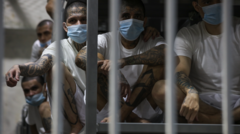President Nayib Bukele of El Salvador has initiated a controversial proposal aimed at negotiating a prisoner swap with Venezuela, calling for a humanitarian agreement that could reshape diplomatic relations.
El Salvador Proposes Innovative Prisoner Swap with Venezuela Amidst Political Tensions

El Salvador Proposes Innovative Prisoner Swap with Venezuela Amidst Political Tensions
El Salvador's president offers a unique exchange of deportees for political prisoners in Venezuela, challenging diplomatic norms.
In a bold diplomatic move, El Salvador's President Nayib Bukele has made an offer to Venezuelan President Nicolás Maduro for a potential prisoner swap that could impact thousands of lives. Bukele proposed to repatriate 252 Venezuelan nationals, who were deported by the United States and are currently imprisoned in El Salvador, in exchange for the release of an equal number of Venezuelan political prisoners detained under Maduro's regime.
Bukele's social media announcement emphasized the contrasting nature of the detainees, stating that the Venezuelans in Salvadoran custody have been implicated in serious crimes such as "rape and murder," while he claims the political prisoners in Venezuela are jailed solely for opposing the Maduro administration. This reflects a significant disconnect between the governments regarding the definition and existence of political prisoners, with Maduro's government denying their presence — a stance that is disputed by numerous human rights organizations.
In his post on X, Bukele characterized the offer as a "humanitarian agreement," suggesting a reciprocal release of detainees could foster goodwill and improve strained relations. He noted the inclusion of approximately 50 prisoners from other nations, including American citizens, as part of the proposed exchange. As of recent weeks, over 200 Venezuelans have been sent from the U.S. to El Salvador, allegedly linked to the Tren de Aragua gang, a criminal organization.
The situation is further complicated by the backdrop of U.S. immigration policies under the Trump administration, which have faced legal challenges regarding mass deportations. Last week, the U.S. Supreme Court ordered a pause on further deportations of Venezuelan nationals, indicating ongoing legal and ethical debates surrounding these actions.
With the Venezuelan government yet to publicly respond to Bukele's proposal, the world watches closely as this potential exchange marks not only a humanitarian issue but also a significant political maneuver in the long-standing conflict between the two nations.


















